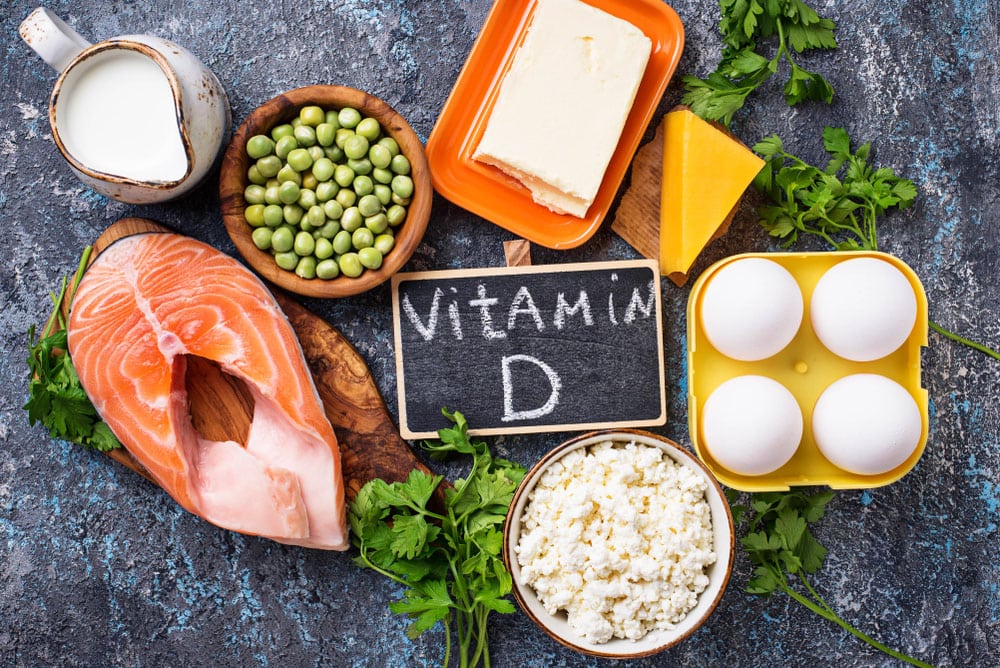- Your cart is empty
- Continue Shopping
Top Healthy Vitamin D Rich Foods

Vitamin D is a unique nutrient that is essential for a number of bodily functions. Vitamin D is required for maintaining strong bones, muscles, and teeth, cell growth control, proper immune functioning, neuromuscular functioning, and our overall health. Vitamin D deficiency can lead to a condition called rickets in which bones fail to develop and function properly.
Vitamin D is a water soluble mineral that is formed in the skin when the skin is exposed to UVB rays in direct sunlight. The downside of this vitamin is that it is not found in many foods. You get a number of food items/products that claim to contain vitamin D but in reality, these food are only fortified with synthetic vitamin D and there are only a select number of foods that actually contain vitamin D.
UV rays are the best natural source of Vitamin D. Our body ideally takes vitamin D in the form of sun synthesis through the skin. But constant exposure to the sun for a long time can increase the risk of developing skin cancer. Thus a balanced approach to sunlight needs to be maintained which can help you to avoid vitamin D deficiency.
The RDA of Vitamin D is
Vitamin D Foods
Below mentioned are the different sources of Vitamin D.
1. Sunshine
Sunshine is the best natural source of vitamin D. A regular dose of sunshine can increase your vitamin D intake greatly. When the sun’s rays hit our skin, it stimulates the production of vitamin D in the body. Around 30 to 60 minutes of walking in sun will provide you with the adequate vitamin D required for the day. To boost your vitamin D levels when in the sun, expose at least your face, arms, and hands, or equivalent area of skin as for vitamin D to be produced, your skin must not be covered with clothing.
2. Salmon
Salmon has by far the highest amount of vitamin D among all the vitamin D sources. Salmon has a high-fat content which makes it an excellent source of Vitamin D. A 3 ½ ounce of salmon will provide you with 80 % of the recommended dietary amount of vitamin D. Buy salmon that has been caught wild or is sustainably farmed. Alaskan salmon contains 5 times more vitamin D than Atlantic salmon, which makes it the best choice for both nutrients and stability. Half a fillet of sockeye salmon contains 1400 IU of vitamin, which makes it twice the recommended amount you need for a day.
3. Supplements
Another way to incorporate vitamin D into your diet is by consuming Vitamin D supplements. There are 2 forms of Vitamin D supplements. One is Vitamin D2 also called ergocalciferol which is synthesized from plants and yeast. This type of Vitamin D supplement is the most extensively used. The other form of Vitamin D supplement is known as Vitamin D3, its scientific term being cholecalciferol. This is the most active form of vitamin D. Since both Vitamin D2 and Vitamin D3 are not active in the body; they need to be metabolized into an active form in the body called Calcitriol.
4. Mushrooms
Mushrooms are another Vitamin D rich food. This is because they are grown in the sunlight and are great at absorbing sunlight. Mushrooms are also rich in B complex vitamins like B1 and B2. Mushrooms also contain Vitamin B5 and copper. Always choose mushrooms that are dried in natural sunlight and not by artificial means as they are the most beneficent. The amount of Vitamin D in mushrooms varies according to their types and varieties. Shitake mushrooms are considered the best source of Vitamin D among all mushrooms.
You can also boost the Vitamin D content in the mushroom by exposing raw mushrooms to UV light. You can also slice the mushroom to absorb more UV rays which will translate more Vitamin D in your food.
[ Read: Vitamin C Rich Foods ]
5. Mackerel
Mackerel have high amounts of omega 3 fatty acid and just 3 1/2 ounce of mackerel supplies us with 90% of IrDA of Vitamin D. Thus people who consume more of these omega 3 fatty acid rich fish infuse their body with essential minerals and vitamins which a human body cannot produce on its own.
6. Halibut
The firm white meat and sweet flavor of halibut have made it a favorite among fish lovers. This flatfish is a nutritionally dense food and contains important minerals and vitamins like phosphorus, selenium, Vitamin B12, B6, and omega 3 fatty acids. Halibut is also one of the best sources of Vitamin D and 100 grams of halibut fish contains 1097 IU of the sunshine vitamin.
7. Herring
Herrin contains a significant amount of Vitamin D as they feed on plankton which is full of Vitamin D. These shiny gray fishes are consumed pickled, smoked, or creamed. Herring provides us with healthy fats and other important nutrients in the body which makes it a wise addition to the diet. It is an excellent source of protein that promotes muscle development and contains high amounts of Vitamin B12, selenium, phosphorus, calcium, and iron.
8. Cod liver oil
Cod liver oil has been a popular supplement for many years and is extremely rich in Vitamin D, Vitamin A, and omega 3 fatty acids. Consuming this oil regularly will promote healthy and strong bones, prevent osteoporosis in adults and improve brain activity. Cod liver oil is also available in capsule form which is the best option for those who don’t like its strong aroma.
9. Caviar
Caviar is a common ingredient used in sushi and provides 232 IU of Vitamin D per 100-gram serving. This is a high priced, grainy textured fish that has a luscious taste and is a wonderful appetizer. This lush fish is a storehouse of nutrients and contains minerals like selenium, iron, magnesium, calcium, and phosphorus. It also contains essential vitamins like Vitamin A, Vitamin K, Vitamin B6, Vitamin C, folates, riboflavin, and pantothenic acid.
10. Sardines
Sardines are becoming more and more popular with their amazing health benefits and are one of the best sources of Vitamin D. Just a small amount of sardines will fulfill 70% of your recommended dietary allowance of Vitamin D. This fish offers 270 IU of Vitamin D per 100 grams. These small fishes are also a great source of Vitamin B12, omega 3 fatty acids, protein, and selenium. The high omega 3 acid content contributes to bone health, lowers cholesterol, and reduces inflammation.
11. Catfish
Catfish, like herring breed, feed constantly on plankton and always take in minuscule sea life that creates vitamin D from sunlight. Low in calories, they contain vitamins, protein, and good fats. Just one filet provides 200% of recommended daily value. 159 grams of catfish provides 795 UI of Vitamin D.
12. Tuna
3 Ounces of Tuna provide 50% of the Vitamin D that our body needs. Fresh and wild caught tuna is the most nutritious. Moreover, eating oily fish that lubricates the body also provides other health benefits like better memory and proper brain function. Light tuna has the maximum amount of Vitamin D and even has less mercury level than white tuna.
13. Sole/ Flounder fish
Sole and flounder are flatfish that contains 1/4th of the daily required amount of Vitamin D. Pacific flounder and sole fishes are best for consumption.
14. Beef liver
Beef liver is a good source of Vitamin D and 3 ounces of beef liver contains 42 IU of Vitamin D and around 1/4th of the daily Vitamin D requirement. Beef is also a good source of Vitamin B12, iron, and protein. Grass fed beef is best for consumption as they contain a good amount of all essential nutrients. Other nutritional benefits that it provides include protein and thiamin.
15. Ricotta cheese
Ricotta cheese stands out as it is the only source of Vitamin D among all milk by products and contains five times more Vitamin D than other cheese. It contains a relatively high amount of Vitamin D with 25 IU of Vitamin D per serving.
16. Carp Fish
Carp fish is also a good source of Vitamin D and 100 grams of this fish contains 988 IU of vitamin D. Apart from Vitamin D, this fish also contains vitamin A, D, E, and K, niacin, riboflavin and minerals zinc, like copper, magnesium, sodium and so on.
17. Eggs
Eggs contain vitamin D in small amounts. Including one egg daily in your diet will provide you with 10% of recommended Vitamin D. Pasture raised hens spend a lot of time outdoors thus containing the highest amount of Vitamin D than any other eggs on the market. Besides Vitamin D, eggs are also a good source of Vitamin B12 and protein.
18. Salami
Salami provides 62 IU of Vitamin D per 100 grams while sausages provide 55 IU of Vitamin D per 100 grams. Though salami, ham, and sausages are good sources of Vitamin D, they are found to raise the level of cholesterol and contain high levels of sodium. Excess to salami and ham can increase the risk of stroke, hypertension, and heart attack.
19. Cereal
Some forms of cereals are also equipped with Vitamin D. Before buying cereals, check the nutritional value behind the cereal box to get information about the level of Vitamin D content. Choose the ones which contain at least 100 IU of Vitamin D. All bran cereal provides 131 IU of Vitamin D, while fruit flavored cereals provide us with 11 IU of Vitamin D.
20. Milk
One glass of milk will provide 20% of your daily requirement of Vitamin D. Skimming milk removes Vitamin D nutrients, as it is a fat soluble vitamin. So always opt for whole fat milk. Skimmed milk, these days are also fortified with Vitamin D to ensure that we don’t lose this precious nutrient. Other dairy products like cheese, yogurt, and ice cream do not contain vitamin D or fortified vitamin D. Thus only fluid milk and products made with whole milk contain this nutrient.
21. Oysters
Oysters are a great source of Vitamin D. Raw, wild caught oysters contain 320 IU of Vitamin D per 100 grams – that is a whopping 80% of our daily requirement. In addition, oysters are also a good source of Vitamin B12, zinc, iron, manganese, selenium, and copper. It is observed that the nutritional value is much higher if oysters are eaten raw. They are also high in cholesterol and should be consumed in moderation. Care should be taken by people who suffer from cardiovascular ailments. However, one should prefer to properly cook oysters before eating, so as to destroy the harmful bacteria present in raw oysters.
22. Orange Juice
A glass of fresh orange juice is the best way to start the day. But you can also consider packaged juices if you fall short of oranges. Packed Orange juice is equipped with good amounts of Vitamin D. One cup of orange juice contains 100 IU of Vitamin D and 120 calories.
23. Soy products
Every 79 gram serving of Tofu offers 581 IU of Vitamin D. One cup of plain light soya milk provides 338 IU of Vitamin D while soy milk fortified with calcium, Vitamin A, and D provides 297 to 313 IU. You can also try soy yogurt as it offers 161 IU of Vitamin D.
24. Shrimp
Every 85-gram serving of shrimp contains 139 IU of Vitamin D. It comprises moderate amounts of omega 3, protein, and fewer amounts of fat. You can indulge in this seafood without worrying about your weight. Shrimp is a good source of antioxidant mineral, selenium.
25. Margarine
Margarine spreads are fortified with Vitamin D which makes them a delicious food product. Being a good source of Vitamin D, it is a healthier option than normal butter as it contains 65% less saturated fats than butter. Margarine also contains moderate amounts of omega 3 fatty acids and monounsaturated acids which makes it a good option for breakfast. The following two tabs change the content below.




